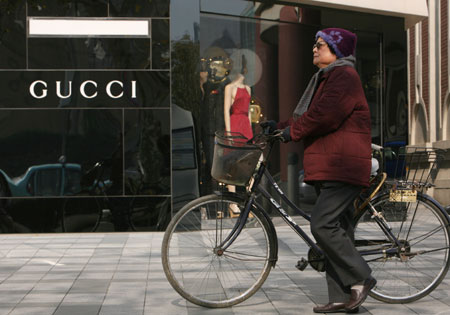Economy
Experts call for narrowing of wealth gap
By WANG XIAOTIAN (China Daily)
Updated: 2010-05-20 09:50
 |
Large Medium Small |
|
 |
|
A woman pushes her bicycle past a Gucci store in Shanghai. The Gini coefficient, a measure of income inequality commonly used by economists and institutions, reached o.47 in China in 2005, overtaking the recognized warning level of 0.4, according to the World Bank. [Kevin lee/ Bloomberg] |
The Gini coefficient - a measure of income inequality commonly used by economists and institutions - reached 0.47 in China in 2005, overtaking the recognized warning level of 0.4, according to the World Bank.
Although no new calculation has been released to gauge the latest situation of income inequality in China, the previous World Bank figure basically represents the nation's current situation and the gap is widening dramatically, said Zhang Juwei, professor and director of the labor and social security research center at the Chinese Academy of Social Sciences.
Zhou Tianyong, senior economist of the Party School of the Central Committee of the Communist Party of China, said in a recent article that in 2008, the Gini coefficient was 0.47 in China.
"When the Gini coefficient reaches around 0.5, it means the inequality problem is extremely severe and needs immediate action to bring it down," Zhang said.
Li Xunlei, chief economist with Guotai & Junan Securities, said that even if the government implements reasonable fiscal and tax reforms, the gap would narrow no earlier than 2015, when the labor supply no longer exceeds demand due to the aging population.
He said the income difference measured by certain indexes such as Gini coefficient might not reflect the real situation in China as it fails to take the local social welfare system and wealth disparity into account.
"Things could be even worse if we consider all these aspects," warned Li, citing although the index of the United States is also above 0.4, but expenditure on social security and welfare accounts for about 50 percent of its total fiscal outlay, 40 percentage points higher than in China.
In addition, the assets of the richest 10 percent of the population account for 45 percent of the total residential assets in China, while the poorest 10 percent own just 1.4 percent of the total assets, according to an official report released in 2004.
As for solutions, analysts are divided on where the strongest measures should be taken. Zhang said the emphasis should be placed on the primary distribution of national income.
"It is the root of the income distribution system. The government should do more to raise the proportion of laborers' incomes in the income basket, which has been declining for years," he said, adding that capital investment has been a major reason for the disproportionately high ratio of wealth held by the rich.
He said raising farmers' incomes is a practical measure and by doing that, the salaries of low-income groups like migrant workers would also go up.
But Li said the space for policy adjustment in this field is very limited, especially given the looming debt problem for local governments and constant over-supply in the country's labor market.
|
||||
"The time has arrived for fiscal revenue to rely more on direct taxes like individual income tax and property tax, instead of indirect ones like value-added tax, where the burden is shouldered by ordinary consumers," said Zhu Baoliang, deputy director of economic forecasting department of the State Information Center.
Early this year, Premier Wen Jiabao pledged more vigorous reforms of the country's income distribution system, promising to promptly formulate policies and measures, including expenditure of 318.5 billion yuan to expand the social security system and raise the level of the basic pension for retirees by 10 percent.



